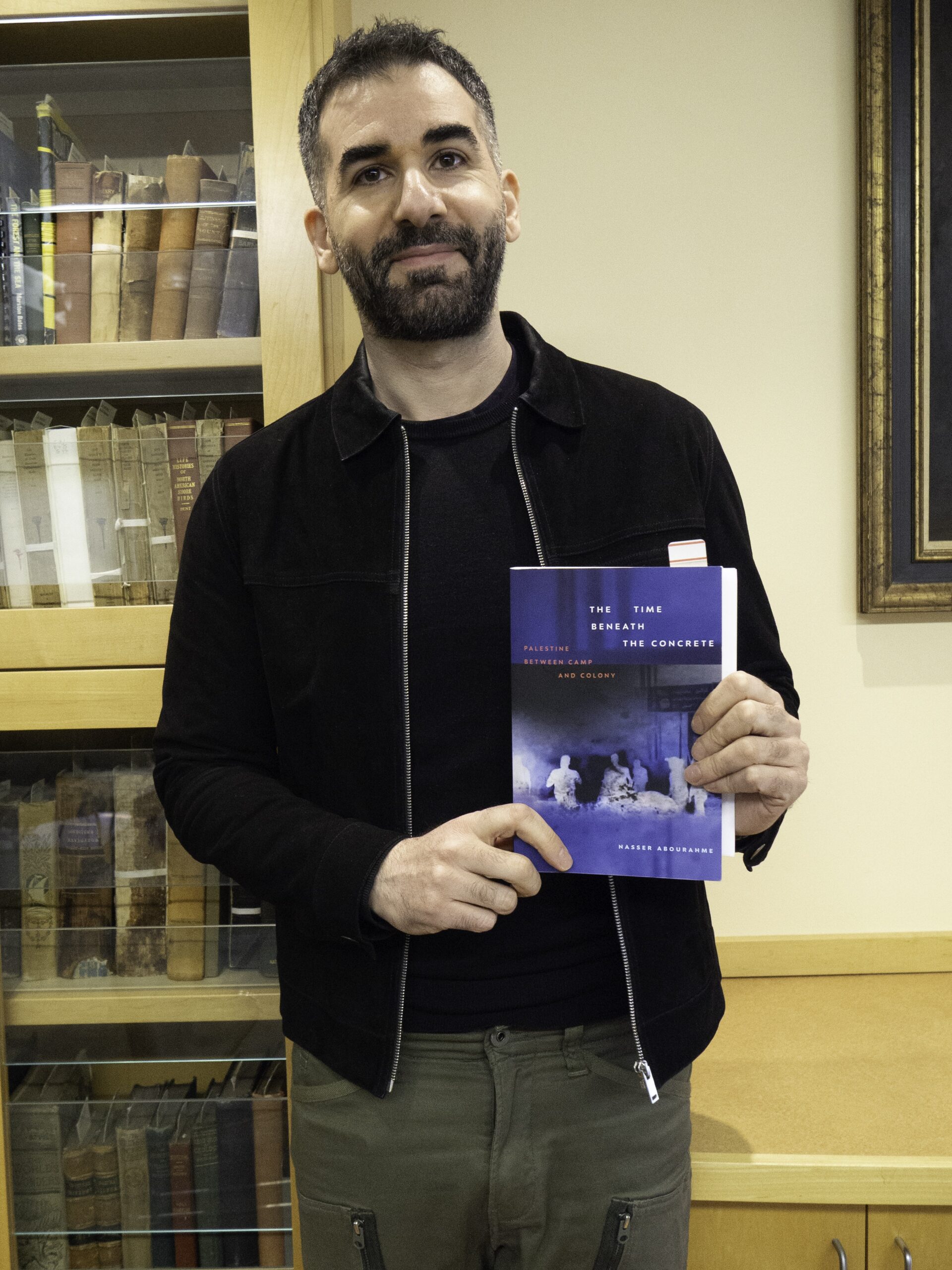Professor Abourahme discusses settler colonialism, time and ongoing genocide in Palestine in new book launch
May 2, 2025
 Isa Cruz
Isa CruzYesterday evening, the Hawthorne-Longfellow Library (H-L) hosted a book talk to celebrate the release of Assistant Professor of Middle Eastern and North African Studies Nasser Abourahme’s new book, “The Time Beneath the Concrete: Palestine Between Camp and Colony.” The book focuses on Palestinian refugee camps, discussing the experiences of the Palestinian people under settler colonialism.
Abourahme began the discussion by emphasizing one of the book’s major takeaways: One must pay attention to the genocide of Palestinians and its larger aims as a form of settler colonialism.
“In my reading, the only way to really come to terms with what the genocide is or where the genocide came from is to think about the particular historical and structural contradictions of Zionism as a settler colonial project,” Abourahme said.
Explaining his goals in writing the book, Abourahme said that he wanted to tell the story of the ongoing genocide in Palestine through the use of Palestinian refugee camps.
“I try to tell the story of the question of Palestine by telling the story of the camp. I trace a certain sort of history of the camp as a political object. I’m interested in how the camp itself has been planned, conceived, regulated, targeted, celebrated, disavowed and transformed in all of these various ways,” Abourahme said.
Abourahme argued that rather than coming from a place of retaliation, settler colonial projects like the one occurring in Palestine are a strategy to gain power, especially over time and memory.
“The press often talks about it as a war of vengeance, but it is also something that is structural…. The book is essentially about this temporal impact,… the time that is stuck and about the forms of life and refusal that have shaped that impasse. Because at the core of my claims in the book is that settler colonialism everywhere is always about the conquest [of] time as much as it is about the conquest [of land],” Abourahme said.
Time is a key theme in the book. Abourahme emphasized the importance of considering the historical context in which a struggle takes place.
“There is a struggle between a political order that seeks to close time, seeks to close the past and self-reproducing regimes of law and property that will render dispossession a mere technical formality that will allow for a kind of transition,” Abourahme said. “And on the other [hand], practices of refusal, and importantly, practices of return, that seek to keep that time open, that seek to obstruct transition, that seek to keep time unresolved, undefined.”
Abourahme explained that his focus on Palestine helped him understand patterns in settler colonial projects at large.
“It’s about the central drive that I think structures all of these projects at some level, which is a drive towards self-supersession. All settler colonial projects ultimately seek to move toward, even if they never accomplish, not just the elimination of the native but the nativization of the settler,” Abourahme said.
On a similar note, Abourahme noted that the use of camps for Palestinian refugees reflects the larger global phenomenon of using camps to contain populations that are viewed as surplus.
“Our world is a world of surplus [and] absolutely disposable people. And it’s a world of mass encampments,” Abourahme said. “The camp has become a sort of go-to solution for those we refuse to cohabit with. And it has lost any sense of scandal, any sense of outrage,” he said. “It’s an entirely normalized facet of border and migration policy.”
Eisa Rafat ’25, who attended the talk, said that hearing Abourahme’s perspective was grounding and informative in learning more about the Palestinian genocide, especially in a way that contrasted information available through social media.
“Unfortunately, this game of tragedy has started to take over our attention spans. It has to be some number of deaths or some really tragic situation [for us to] pay attention to these things,” Rafat said. “And it takes [away] a lot [from] the time we may spend actually reading more about and understanding the foundations of the Palestinian movement.”
To end the discussion, Abourahme referenced the words of Gustavo Petro, the president of Colombia, to emphasize that the genocide occurring in Palestine should not be seen as a one-time event.
“[Petro] says Gaza is a rehearsal of the future because the logic of extermination that is being deployed there, he says, is what awaits,” Abourahme said. “He’s saying that there is a political logic at work in the world. It’s a logic of racial exterminability that has always been there. And he’s saying that the genocide is inaugurating a new age, and there’s plenty of evidence to suggest that … it is rising to the surface again.”

Comments
Before submitting a comment, please review our comment policy. Some key points from the policy: